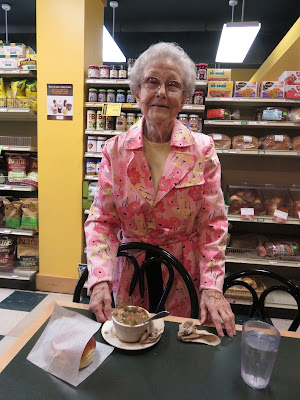Benefits of buying from the bulk aisle
By Rebecca Yaeger-Bischoff
For The Hillsider
 |
| Rebecca Yaeger-Bischoff |
When I was a kid I remember going with my grandma to Amazing Grains, our local food co-op in Grand Forks N.D. (not to be confused with Amazing Grace, the cafe and bakery in Duluth), and seeing big bins of baking ingredients like flour, oats, and nuts. At first I thought it was strange because I’d never seen anything other than candies in bulk bins at the grocery store. I watched as my grandma, an avid bread baker, scooped flour and oatmeal into containers she’d brought from home. Once we were done we brought the containers up to the checkout counter for an employee to weigh them and calculate the cost.
 |
| Rebecca's grandma in Amazing Grains, a co-op grocery store which sells food in bulk. |
Three Reasons to Buy from the Bulk Aisle:
Save Money - Bulk foods tend to be cheaper because you’re not paying for the extra packaging and marketing costs from all the flashy labels or cartoon characters. You can buy as much or as little as you want. I especially like this advantage when buying spices. I don’t have to buy a whole spice jar if I only need a couple of teaspoons.
 |
| Three reasons to shop bulk: cheaper, reduce waste and reduce your carbon footprint |
Reduce Your Carbon Footprint - It takes a lot of energy (mostly from fossil fuels) and resources (water, trees, aluminum, plastic) to package food. Energy use gives off greenhouse gases, such as carbon dioxide, that are major contributors to climate change. A carbon footprint is a measurement of the amount of greenhouse gases produced by a person, activity, or product. Less packaging means less energy used for resource extraction and making the packaging, which lowers the carbon footprint of the food. Transportation of the food is also more efficient because without all that packaging taking up space, there’s more room for food on the delivery truck.
Tagline here: Rebecca Yaeger-Bischoff lives in Lincoln Park, has a degree in environmental science, is a 5 Gyres Ambassador, leads Zumba classes and is interested in health and wellness. Full disclosure: She is also the daughter of The Hillsider editor Naomi Yaeger-Bischoff.

